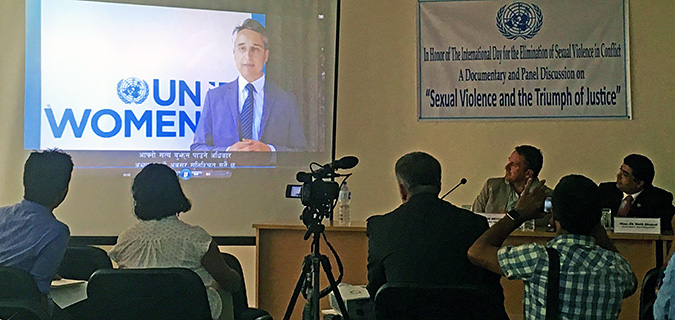International Day for the Elimination of Sexual Violence in Conflict
Date:
Welcome Remarks by UN Women Representative, Ziad Sheikh
29 June 2016 at Transitional Justice Resource Center, Nepal

His Excellency, the Honourable Minister of Peace and Reconstruction, Mr Eak Nath Dhakal, Mr Rishi Rajbhandari, Joint Secretary, Ministry of Peace and Reconstruction,Representatives from the Truth and Reconciliation Commission and the Commission on Investigation of Disappeared Persons,Senior Government officials, Representatives from Civil Society and the Conflict Victims Common Platform,Development Partners and colleagues from the UN, Representatives from the media, Distinguished guests, ladies and gentlemen.
On behalf of the UN in Nepal, I am pleased to welcome you all to today’s programme to commemorate the International Day for the Elimination of Sexual Violence in Conflict.
In June last year, the United Nations General Assembly proclaimed the 19th of June each year as the International Day for the Elimination of Sexual Violence in Conflict, to raise awareness of the urgent need to put an end to conflict-related sexual violence, to honour its victims and survivors, and to pay tribute to all those who courageously work to put an end to such violence and to seek justice for those whose lives have been scarred by these crimes.
The world has recognized CRSV as a grave breach of international humanitarian law. However, we continue to witness appalling levels of sexual violence during and after wartime. It targets predominantly women and girls, but also men and boys, who after having suffering physical injuries and psychological trauma, face stigmatization and rejection by their families and communities, as well as reprisals from the perpetrators. Unsurprisingly, these crimes often go unreported.
In Nepal, a decade after the end of the armed conflict, many continue to endure the pain and trauma in silence. The victims of conflict related sexual violence are yet to be officially recognized.
In its most recent Concluding Observations to the Government of Nepal regarding women affected by the conflict, the CEDAW Committee urged the Government to ensure women’s access to justice, including women victims of sexual violence. Here, I would like to congratulate Bandana Rana on her recent election to the CEDAW Committee and wish her every success in advancing women’s rights globally and here in Nepal.
More recently, the 2015 Global Study 2015 on the Implementation of UN Security Council Resolution 1325, highlighted that survivors of conflict-related violence in Nepal, including gender-based violence, continue to face obstacles in seeking justice and related compensation and reparations. Further, official and accurate data regarding conflict-affected women and survivors of Sexual and Gender Based Violence is often missing, despite the fact that unofficial estimates exist. The Study goes on to state that survivors of CRSV face stigmatization, inadequate access to services, limited victim/witness protection, and threats from their own community.
The Government of Nepal has demonstrated leadership and commitment towards meeting its obligations within the women, peace and security agenda. The country’s National Action Plan for Security Council Resolutions 1325 and 1820 is globally recognized as a model plan and some good progress has been made in its implementation. The Government last year convened a roundtable discussion on CRSV to generate a dialogue towards finding solutions. The UN strongly encourages the Government to take this initiative forward.
At the same time, the Government has recognized the gaps and shortcomings in meeting its obligations under Security Council Resolution 1820. It has therefore recognized that any second phase of implementation of its National Action Plan must address conflict related sexual violence. The UN remains committed to working with the Government in line with international law and standards.
As a first step, officially recognizing sexual violence survivors as conflict victims will strengthen their ability as victims of human rights violations to exercise their right under international law to an effective remedy. It will also promote an understanding that survivors are not to blame for what happened, opening an opportunity for healing and for survivors to seek assistance.
Thank you.